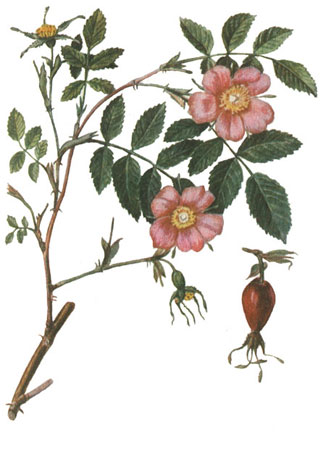Rosehip cinnamon – Rosa cinnamomea L.
Shrub of the family Rosaceae (Rosaceae), reaching 2.5 3 m height. It grows in the European part of Russia, in Siberia, the Caucasus. For medical purposes, harvest the fruits of plants for use in native form, and for the production of various herbal remedies.

Rosehip cinnamon – chemical composition
The fruits of the plant contain sugar, pectins, tannins, organic acid (apple, Citric, oleic, linoleic, linolenic), flavonoidы (Quercetin, izokvercitin, rhobinine, which, ruʙiksantin, lycopene and others.), fixed oil, ascorbic acid, vitamins B1, B2, P и pp, K, carotene (provitamin a), tocopherols (vitamin E), iron salts, manganese, Phosphorus, magnesium and calcium.
Rosehip cinnamon – Pharmacological properties
Preparations from the hips with diverse pharmacological activity, It depends primarily on the content in the plant complex vitamins. Ascorbic acid essentially determines the biological activity of fruit plants. Rose hips and therapeutic drugs are have antiscorbutic action, significantly increase the redox processes in the body, so as ascorbic acid and dehydroascorbic acid, formed at its oxidation, involved in the oxidative deamination of aromatic amino acids, activate several enzyme systems, stabilize the content of adrenaline and other catecholamines, stimulate the body's resistance to harmful environmental effects, infections and other adverse factors.
Besides, now experimentally proven protivoskleroticheskoe effect of ascorbic acid, which manifests itself in the reduction of cholesterol concentration in blood and inhibiting the deposition of atheromatous mass in the walls of blood vessels.
These pharmacological properties of drugs from hips potentiated due to combined content of the fruit plant ascorbic acid and rutin (Vitamin P). The presence in the plant vitamins in fruits, E and carotene gives this vegetable vitamin complex complete perfection, t. it is. herbal rosehip acquire missing links stimulating effect on anaerobic decarboxylation of pyruvic acid and subsequent activation of enzyme systems. Dog-rose fruit, Besides, enhance tissue regeneration, the synthesis of hormones, a beneficial effect on carbohydrate metabolism, vascular permeability, etc.. d. They also possess anti-inflammatory, choleretic and diuretic properties.
Rosehip cinnamon – medical applications
Rose hips are primarily used for the prevention and treatment of hypo- and avitaminosis C and P, which manifest violation of the permeability of the vessel walls, decrease in the body's resistance to harmful endogenous and exogenous factors influence. Deficiency of ascorbic acid is observed in humans, experiencing a long period of physical and mental stress. This also applies to patients, had undergone surgery, injury, pregnant and lactating women.
Preparations rosehip is prescribed for acute and chronic infections, in atherosclerosis, nephritis, acute and chronic liver diseases, bowel, with ulcers, hemorrhagic diathesis, gemofilii, bleeding (lung, tubal) , an overdose of anticoagulants, hyperthyroidism, and adrenal insufficiency, traumatic shock.
Rosehip used for pneumonia, ʙronxopnevmonii, bronchiectasis. Vitamins, contained in rose hips, increase the protective properties of the body of the patient and facilitate the course of the disease. Since ascorbic acid plays an important role in the nutrition of human ocular tissues (especially a lot of ascorbic acid found in the lens of the eye, its content decreases with the development of cataracts), rosehip drugs effective in the treatment of eye diseases, caused by vascular disorders (hemorrhagic retinitis, xorioidit, vitreous hemorrhage).
Dog-rose fruit is used in the treatment of asthma, the therapeutic effect is based on the reduction of serum fibrinogen and globulins, the number of which increases in response to the intake of foreign proteins. Bile properties of rosehip used in cholecystitis, gepatitah.
From the seeds of rose hips an oil, which contains unsaturated and saturated fatty acids, carotenoids and tocopherols. Rosehip oil is used topically as a wound-healing agent in dental practice in gingivitis, stomatitis, as well as cracked nipples, bedsores, trophic ulcers of the lower leg, Medicine. With ulcerative colitis, he was appointed as microclysters.
Rosehip cinnamon – Dosage Forms, Dosing and Administration
Infusion of rose hips: 10g (1 tablespoon) the fruit is placed in an enamel bowl, Pour 200 ml (1 glass) hot boiled water, capped and heated in boiling water (in a water bath) 15 m, cooled at room temperature for 45 m, filter. The remaining raw materials squeeze. The volume of the resulting infusion was adjusted with boiled water to 200 ml. The prepared infusion stored in a cool place no more than 2 d.
Take ½ cup 2-3 times daily after meals as Vitamins.
Fruit stored in dry, cool place.
Holosas (Cholosasum). Syrup, cooked on condensed water extract of rose hips and sugar. Thick, syrupy liquid of dark brown color, sweet-sour taste, peculiar smell. Assign with cholecystitis, for hepatitis 1 teaspoon to receive 2-3 times a day, children - 1/4 teaspoon 2-3 times a day.
Store in a dry, cool place.
Rosehip syrup. Produced with the content of ascorbic acid 5 mg 1 ml.
Tea made from rose hips and black currant: 20 g of fruit in equal parts is poured two cups of boiling water, infused for 1 no, filter, added sugar, Take 1/2 cup 3-4 times a day.
Tea made from rose hips and rowan berries. The fruits are mixed in equal parts; 2 teaspoons of the mixture is poured two cups of boiling water, infused for 1 no, filter, add sugar to taste, Take 1/2 cup 3-4 times a day.
Tea from the hips with raisins. Raisins washed, ground, pour boiling water (in relation to 10:100 ml), boiled for 10 m, wring, filter, add as much of infusion of rose hips, Take 1/2 cup several times a day.
Oil of rose hips (Оleum Rose) - Oily liquid brown, bitter taste and peculiar smell.
Store in a dark place at a temperature no higher than +20 ° C.
